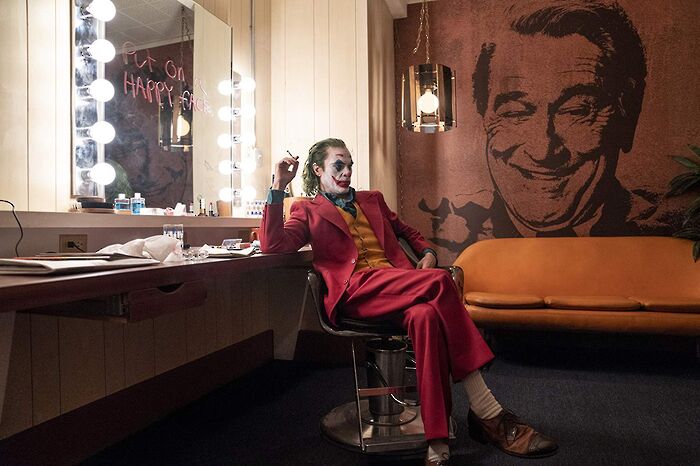None of us needed another Joker origin story
Compared to past narratives of the Batman villain, this one is self-indulgent and superfluous, argues Michele Sanguanini
Content Note: This article contains discussion of on-screen violence, including gun violence, and mentions abuse from family members.
Joker is definitely one of the most controversial movies of the fall movie season. The surprise winner of the Golden Lion at the 2019 Venice Film Festival, since its release it has broken box office records but received marmite reviews from critics.
Some praise its dark, realist portrayal of the origin of Joker, departing from the over-the-top, cartoonish mannerisms of other takes on the DC universe, such as Tim Burton’s Batman or the more recent Suicide Squad. Others have engaged with its depiction of class and racial tensions between a majority white and out-of-touch elite, and an impoverished working class that ends up rioting in the streets.
Coming up with an alternative origin story of the Joker, one of the best loved villains in the DC universe, is a bold and daunting enterprise. Critics recognise Alan Moore’s Batman: the Killing Joke as the Joker origin tale, and consider it one of the best Batman comic stories of all times. Cinema and comic writing carry some structural differences, but the weakness of Joker’s storytelling when compared to Batman: the Killing Joke is nonetheless striking.
Both stories try and explore the human side of what has become the quintessential nihilistic villain. Todd Phillips builds his Joker on a painfully slow crescendo of alienation and abuse from family and society, which transforms kind-hearted party clown Arthur Fleck, a man who suffers from uncontrollable bursts of laughter, into a mass-shooter Joker.
The triviality of this script is quite apparent when compared with Moore’s sharp counterpoint of the Joker’s ultra-violent crimes with flashbacks, where chance and uncontrollable events lead an unnamed petty criminal to fall into a chemical waste tank (and into madness).
Starting from one of the turning points of the plot, Fleck killing three rich kids harassing him on the subway, Hildur Guðnadóttir’s epic-sounding soundtrack could have been replaced by Pumped Up Kicks. In addition, the murder has the side effect of starting a movement against Gotham’s wealthiest people. In the over-abundance of subplots trying to rally the audience’s emotions, the writers double down in a series of confusing and tedious fragments. It’s all too much, and yet ultimately doesn’t add up to anything.
“Social issues are used simply as a plot device in this shallow origin story”
Moreover, most references to the Batman universe feel quite unnecessary and out of place: the city is New York; the rich are Wall Street bankers; the murder of Bruce Wayne’s parents by one of the clown rioters is a gratuitous deviation from the canonical mugging accident.
But even if Joker wasn’t a patchwork of plot lines from at least three potentially interesting movies forced to be set in the Batman universe, the question is worth asking: did it really make sense to have a movie on the origins of this notorious villain?
Looking at box office profits, absolutely. In only ten days, the movie grossed almost ten times its budget. Along with other DC-related blockbusters from recent years (Batman V Superman: Dawn of Justice and Suicide Squad), Warner Brothers has probably found its goose that lays the golden eggs. The fact that three movies with characters from Batman’s comic world have been announced for 2020 (Birds of Prey) and 2021 (The Suicide Squad, The Batman) only confirms this suspicion.
From a creative point of view, I am not so sure. The relationship between mental illness and social issues – such as poverty, precarious employment and housing, or drug abuse – is just an instrument used as a plot device to make Arthur a nihilistic killer.
Do we need another origin story for the Joker? Honestly, I don’t think so. One of the most attractive characteristics of the Joker portrayed by Heath Ledger is his lack of a clear origin – the Joker becomes the physical embodiment of the self-destructive side of humanity.
Notwithstanding Joaquin Phoenix’s very solid performance, his Joker is not a convincing psychotic villain. He doesn’t kill because life and order are just a joke, nor out of pure spite towards other people. His transformation is not even because of a chemically-induced visceral hatred and paranoia, as in Ed Brubaker’s Batman: The Man Who Laughs.
He kills looking for revenge towards a society that mistreated him for all his life, and the whole movie feels like the coming of age story of an overgrown school-shooter. This is a very tragic and very shallow take on the origin of one of the most vicious and nihilistic arch-enemies of the mainstream comic world.
 Arts / Plays and playing truant: Stephen Fry’s Cambridge25 April 2025
Arts / Plays and playing truant: Stephen Fry’s Cambridge25 April 2025 News / Candidates clash over Chancellorship25 April 2025
News / Candidates clash over Chancellorship25 April 2025 Music / The pipes are calling: the life of a Cambridge Organ Scholar25 April 2025
Music / The pipes are calling: the life of a Cambridge Organ Scholar25 April 2025 Comment / Cambridge builds up the housing crisis25 April 2025
Comment / Cambridge builds up the housing crisis25 April 2025 News / Cambridge Union to host Charlie Kirk and Katie Price28 April 2025
News / Cambridge Union to host Charlie Kirk and Katie Price28 April 2025






